Driving sustainability from niche to norm
IDH convenes companies, CSOs, governments and others in public-private partnerships. Together we drive the joint design, co-funding and prototyping of new economically viable approaches to realize green & inclusive growth at scale in commodity sectors and sourcing areas.
Our approaches are designed to drive sustainability from niche to norm in mainstream markets, delivering impact on Sustainable Development Goals. We focus on creating positive impact on deforestation, living incomes and living wages, working conditions, toxic loading and gender.
IDH is supported by multiple European governments, including our institutional donors: BUZA, SECO and DANIDA and we work together with over 500 companies, CSOs, financial institutions, producer organizations and governments in 11 sectors and 11 landscapes in over 50 countries worldwide.
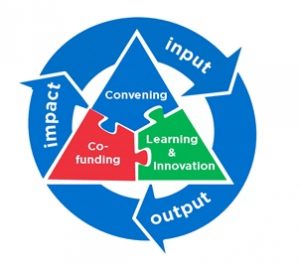 We co-finance the prototyping of new approaches that are modeled to accelerate green and inclusive growth. We only co-fund when there is over 50% of private funding available; if the approaches are innovative: we don’t fund business as usual and if we can proof a strong public social and environmental added value: our funds must stretch the public good agenda. And we pilot finance facilities to de-risk loans to smallholder farmers.
We co-finance the prototyping of new approaches that are modeled to accelerate green and inclusive growth. We only co-fund when there is over 50% of private funding available; if the approaches are innovative: we don’t fund business as usual and if we can proof a strong public social and environmental added value: our funds must stretch the public good agenda. And we pilot finance facilities to de-risk loans to smallholder farmers.
Through prototyping we adapt, learn and innovate to make sure our approaches are cost efficient, economically viable, scalable and can be embedded and institutionalized by us and others. We gather insights from experts that help us with our design, and disseminate our experiences and learning through publications, key notes and workshops.
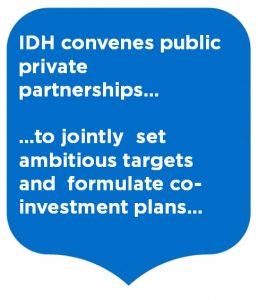
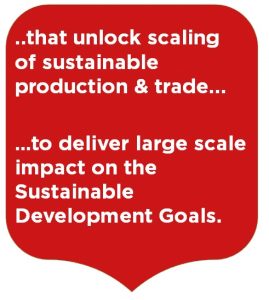
Front running companies want to deliver on their public sustainable/no deforestation commitments. They want to invest in sustainable production and trade at scale to mitigate their reputational risks, secure supply and reduce costs.
Governments aim to save the environment, fight poverty, support food security, health & safety and gender equality. They may implement laws & regulations and invest in projects that produce public good and endorse initiatives.
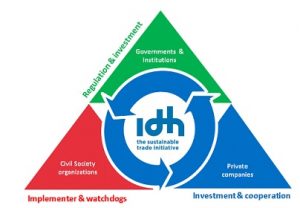
Working together to create impact @ scale
Issues like deforestation, water pollution, poverty, gender and working condition exceed the scope of any individual company or government. To tackle them, governments, CSOs and companies need to work together to create large scale and (cost) efficient change.
Public private cooperation enables governments to strengthen their public good efforts with additional funding, knowledge, supply chain infrastructures and procurement power. For companies working with governments and CSOs adds legal and jurisdictional power, endorsement, credibility and co-financing capacity.
Co-funding & de-risking capital investments
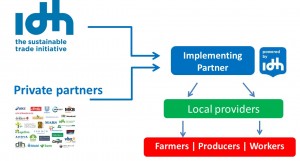
IDH runs programs with multiple companies in precompetitive public-private partnerships. We co-invest (max 50%) with industry and trade and others (funders, governments, CSOs etc…) in 11 sector programs and 11 landscapes to push markets toward higher levels of sustainability (see also: Our impact areas).
We strive for a co-funding ratio of 1 (IDH) -1,5 (private partners) and hope to lift that ratio to 1-13 by introducing a de-risking model (see approaches): small scale farmers in developing economies do not have the collateral nor a history in paying back loans. For banks, loans to small holders are seen as too risky. But lack of working- and investment capital hampers the sustainable growth of smallholder businesses. Through simultaneously professionalizing farmers and de-risking loans, we aim attract commercial capital, creating an economic viable, market based, sustainable business model that moves away from co-funding towards capital-investments. Eventually, creating an exit strategy for IDH and other funders: when we move out, the investments in programs won’t stop.
Learning & Piloting new approaches
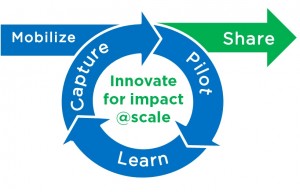
Everything we do is piloted in the ‘real economy’ and is designed for large scale implementation. Together with CSOs, companies and experts, we identify and assess the most significant sustainability issues in sectors. And prototype with companies next-stage solutions for critical bottlenecks in addressing these issues, pushing businesses into higher levels of sustainability.
While doing so IDH gathers data, develops sector analyses, field evidence and business cases for sustainable growth and shares those insights to inform public and private strategists, decision-makers and a wider audience. We catalyze new cooperation- and investment models (see approaches). And we create “think-tank dialogues” where sector stakeholders share thought leadership around complex sustainability challenges and actionable solutions.
We disseminate our knowledge and innovations within and across sectors through meetings, studies, keynotes, workshops and events. In most sector and landscape pages you’ll find resource centers with relevant publications and presentations.
We concentrate our learning around strategic topics like: Service Delivery Models, Innovative Finance, Renovation & Rehabilitation, Deforestation, Living Wages, Gender and Working Conditions. We design and execute impact studies across sectors to assess and improve the IDH intervention models.
Next to these strategic topics the Learning & Innovation Team studies and supports a specific number of approaches to deliver proof of concept. A list of proof of concepts is downloadable here.
Smallholder inclusion and profitability
 Moving millions of smallholder farmers from poverty to middle class
Moving millions of smallholder farmers from poverty to middle class
Millions of smallholder farmers have the potential to move from poverty to middle class. For this to succeed they need to apply better farming techniques, get access to fertilizer, working capital and more productive seedlings, so they can improve the quality and quantity of their yields and become better entrepreneurs. IDH explores cost efficiency and economic viable renovation & rehabilitation schemes, service delivery systems (training, seedlings, finance) and farm diversification models. With these models we aim to move millions of smallholder farmers out of poverty in (e.g.) tea, cotton, palm oil, aquaculture, cocoa, coffee and fresh & ingredients.

Contact for more information:
Iris van der Velden:
vandervelden@idhsustainabletrade.com
Mitigation of deforestation and forest degradation
 Building verified sourcing areas for production & protection
Building verified sourcing areas for production & protection
Agriculture is the biggest driver of deforestation worldwide. Each year between 12 and 15 million ha of topical forests disappear affecting biodiversity and CO2 emissions. IDH works with global businesses, CSOs and governments to build deforestation-free production and sourcing areas. We combine the sourcing commitments of companies, the jurisdictional power of governments, the knowledge and networks of local CSOs to create sustainable land governance models that balance land and water claims, improve degraded land to create economically viable production & protection areas. We focus on deforestation vulnerable areas in Indonesia, East Africa and Brazil.

Living wages and improved working conditions

Revitalizing and incentivizing sectors to enable living wages and improve working conditions
Poor working conditions and gender inequality are still persistent worldwide affecting millions of workers. IDH convenes the industry, NGOs and governments to create an enabling environment to improve working conditions in supply chains and address issues such as living wage, gender, sexual harassment, and health and safety. In the case of tea and apparel, IDH is building multi-stakeholder coalitions in the producing countries that enable and embed solutions at a sector level to benefit millions of workers.

Responsible Agrochemical Management

Implementing Integrated Pest Management
The in discriminant use of agrochemicals to crops and soil causes soil pollution and disturbs the balance in the ecosystem and natural habitat worldwide. This threatens crop production and therefore the source of livelihood for millions of smallholder farmers. The heavy use of agrochemicals also poses a threats to farmers and workers applying them, and to retailers and supply chain managers as a food safety and reputational issue. IDH supports the industry to better manage the input use of agrochemicals, reducing the amount of toxins for both humans and environment.

Contact for more information:
Flavio Corsin:
corsin@idhsustainabletrade.com
Gender equality
 Reducing gender based violence and improving the economic position of women
Reducing gender based violence and improving the economic position of women
In many agro commodities gender based violations and discrimination of women are widespread phenomena. Women often do not own any assets. At farmer trainings its more often the men that turn up, while in most instances it is the women that do the work. Sexual violence and other physical violence occurs and/or sexual favors are demanded by managing staff. IDH runs prototype projects to mitigate gender based violence in tea and pilots new models to improve the position of women in cotton. Worker management dialogues in apparel aim to improve the position of women In partnership with Hivos a gender toolkit for coffee farmers was produced.

Contact for more information:
Judith Fraats:
fraats@idhsustainabletrade.com
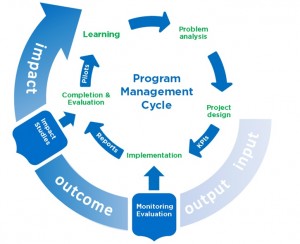 IDH convenes and coordinates public-private partnership that jointly formulate and co-finance sustainable improvement projects. We contract “Implementing Partners” (IPs) to execute these projects. We set strict rules for IP spending: What do we fund and what not, SMART Key Performance Indicators (KPIs): What metric based output and outcomes do we want to see? and the reporting cycles they have to commit to. When do we want to know what? IPs report bi-annualy on their progress. The formulated KPIs are based upon an input, output, outcomes and impact framework. Through our Result Measurement Framework (RMF) we keep track of progress reported by IPs. In addition our program teams are well informed through field visits and regular meetings and discussions. Sector program progress is bi-annually visualized by barometers that you’ll find on each sector page.
IDH convenes and coordinates public-private partnership that jointly formulate and co-finance sustainable improvement projects. We contract “Implementing Partners” (IPs) to execute these projects. We set strict rules for IP spending: What do we fund and what not, SMART Key Performance Indicators (KPIs): What metric based output and outcomes do we want to see? and the reporting cycles they have to commit to. When do we want to know what? IPs report bi-annualy on their progress. The formulated KPIs are based upon an input, output, outcomes and impact framework. Through our Result Measurement Framework (RMF) we keep track of progress reported by IPs. In addition our program teams are well informed through field visits and regular meetings and discussions. Sector program progress is bi-annually visualized by barometers that you’ll find on each sector page.
Impact studies
IDH commissions 3rd party impact studies. The findings of reports, self assessments, discussions and impact studies form the basis for a constant cycle of progress and impact assessments. Lessons learned are looped back into our program strategies to deliver maximum impact.
The IDH Head Quarters are situated in Utrecht, The Netherlands, with international representation in Brazil, Ethiopia, Indonesia, Kenya, Liberia, Malawi, South Africa, Tanzania and Vietnam. HQ monitors and supports all programs and initiates corporate communication and (inter) sectoral learning. This is the IDH HQ team:
Executive Board
[people ids=”504,577,582,649″]
Communication
[people ids=”501″]
Innovative Finance
[people ids=”629″]
International partnerships
[people ids=”630″]
Good Governance
IDH adheres to high standards of good practices and transparency in governance and reporting. We are a publicly funded and government mandated change agent. Our Governance Code clarifies the governance structures and processes beyond our articles of association and regulations. The Governance Code has been formalized by the IDH Executive Board on March 27, 2014, and approved by the IDH Supervisory Board supported by the Audit Committee.
The Governance Code is available for download here. (3.1 Mb)
RSDN nr: 850911916
KvK nr: 53521129
Code of Conduct
The Code of Conduct provides overview of the values, commitments, responsibilities and integrity that IDH stand for. It applies to, and governs all decisions of, our people. This includes employees (incl. Board of Directors) and consultants acting on behalf of IDH. It is our expectation that our business partners apply similar standards of conduct when working with IDH.
The Code of Conduct is available for download here.
ICSR Policy
IDH’s ICSR policy outlines IDH’s strategy for the integration of the OECD guidelines for Multinational Enterprises in its program activities.
The ICSR Policy is available for download here.
Competition Compliance Policy
IDH and all Participants to IDH Programs are committed to full and fair competition. In order to promote the compliance with these laws, IDH has adopted this Competition Compliance Policy in which the basic rules for competition compliance are set out.
The Competition Compliance Policy is available for download here.
Members of the IDH Supervisory Board:
| André Veneman (chair) | Director Sustainability, AkzoNobel |
| Berry Marttin | Member of the Executive Board of Rabobank Group |
| Gosse Boon | Non-Executive Director(KPMG, Albron and Royal BAM Group) & Board Advisor |
| Christian Frutiger | Global Head of Global Affairs, Nestle S.A. |
| Sean de Cleene | Chief Strategy and Partnership Officer, Alliance for a Green Revolution in Africa |
| Kirsten Schuijt | CEO WWF Netherlands |
| Ignacio Gavilan | Director of Sustainability, The Consumer Goods Forum |
IDH Impact Committee
The Impact Committee of IDH governs the impact of the work of IDH. It manages the intervention logic of the current IDH programs and the interventions of the IDH organization. It bases itself upon progress and impact data from the IDH organization (progress reports and 3rd party impact studies). The Committee comes together once a year.
Members of the IDH Impact Committee:
| Prof. Dr. Peter Knorringa | Professor of Private Sector & Development, International Institute of Social Studies (ISS), Erasmus University Rotterdam. Chair of Impact Committee |
| Dr. Bill Vorley | Principal Researcher, International Institute for Environment and Development (IIED) |
| Jan-Kees Vis | Global Director Sustainable Sourcing Development, Unilever |
| Frank Eyhorn | Senior Advisor Sustainable Agriculture, HELVETAS Swiss Intercooperation |
| Kirsten Schuijt | CEO WWF Netherlands |
| Ignacio Gavilan | Director of Sustainability, The Consumer Goods Forum |
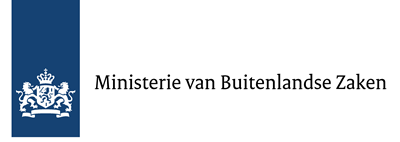 The Global Goals for Sustainable Development show how economic growth can go hand in hand with social development and environmental protection. With trade playing such a key role in achieving sustainable and inclusive economic growth in developing countries, The government of The Netherlands supports IDH to accelerate market transformation towards sustainable supply chains.
The Global Goals for Sustainable Development show how economic growth can go hand in hand with social development and environmental protection. With trade playing such a key role in achieving sustainable and inclusive economic growth in developing countries, The government of The Netherlands supports IDH to accelerate market transformation towards sustainable supply chains.
Next to financier, the Netherlands are an active partner through its embassy network and in international diplomacy. The Ministry of Foreign Affairs has granted IDH an additional €100 million for the period 2015-2020 to co-fund private sector investments in sustainable market transformation in 11 commodity sectors.
Next to that, the Dutch government has granted IDH € 20 million for the period 2015-2020 to pilot a landscape approach in 6 resource vulnerable landscapes. Since 2015, this landscape approach is also funded by the Norwegian Agency for Development Cooperation (Norad).
 In 2013 the Federal Council of Switzerland decided to allocate € 24.5 million (CHF 30 million) to a strategic four-year partnership with IDH within the framework of the State Secretariat for Economic Affairs (SECO) economic development cooperation. This will be used to support public-private cooperation to upscale and accelerate the sustainable production of commodities such as coffee, cocoa, cotton, soy and palm oil.
In 2013 the Federal Council of Switzerland decided to allocate € 24.5 million (CHF 30 million) to a strategic four-year partnership with IDH within the framework of the State Secretariat for Economic Affairs (SECO) economic development cooperation. This will be used to support public-private cooperation to upscale and accelerate the sustainable production of commodities such as coffee, cocoa, cotton, soy and palm oil.
Through sustainable management, the global trade in coffee, cocoa, cotton, soy and palm oil can make a significant contribution to poverty reduction in developing countries. SECO therefore encourages trade that is both socially responsible and environmentally friendly in its partner countries. Cooperating with IDH, which shares the same program approach as SECO, will ensure a more efficient utilization of funds.
![]() Ministry of Foreign Affairs of Denmark states on its website that the developing countries need an enabling environment for the private sector to create economic growth, one of the preconditions for effective poverty alleviation. Thus, it is a strategic priority in Danish development cooperation to work for a stronger private sector. For DANIDA, it is important that Danish businesses participate actively in this endeavor. The Department for Green Growth is the entry-point for companies to Danish development assistance. Here you can find information on the various programs designed to motivate companies to get involved in social and economic development. Danida supports IDH with € 1.2 million for cotton and coffee programs in East Africa.
Ministry of Foreign Affairs of Denmark states on its website that the developing countries need an enabling environment for the private sector to create economic growth, one of the preconditions for effective poverty alleviation. Thus, it is a strategic priority in Danish development cooperation to work for a stronger private sector. For DANIDA, it is important that Danish businesses participate actively in this endeavor. The Department for Green Growth is the entry-point for companies to Danish development assistance. Here you can find information on the various programs designed to motivate companies to get involved in social and economic development. Danida supports IDH with € 1.2 million for cotton and coffee programs in East Africa.
 There is a Grant Agreement between the Norwegian Department for Development Cooperation (Norad) and IDH regarding (QZA 15/0479) Deforestation Free Supply Chains in Liberia, Indonesia, and Brazil.
There is a Grant Agreement between the Norwegian Department for Development Cooperation (Norad) and IDH regarding (QZA 15/0479) Deforestation Free Supply Chains in Liberia, Indonesia, and Brazil.
Norad is a directorate under the Norwegian Ministry of Foreign Affairs. In matter regarding Norway’s International Climate and Forest Initiative (NICFI), Norad reports to the Norwegian Ministry of Climate and Environment. Norad’s functions are laid down in the agency’s terms of references and annual letters of allocation issued by the Ministry of Foreign Affairs and the Ministry of Climate and Environment.
Click here for an overview of all NICFI-funded contracts.
In 2008 IDH officially started and in 2009 IDH organized the first International Supply Chain Management Congress with over 600 participants, including experts like Howard Shapiro and Jason Clay. IDH welcomed in 2009 the first UTZ certified cocoa and sent the first 800 bars of chocolate made with sustainable cocoa, to all its contacts as a New Year Present.
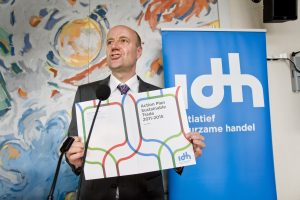 In 2010 IDH presented the Action Plan Sustainable Production & Trade. Over 100 private companies and CSO’s signed up for a plan to invest over 500M euro in 18 critical commodities, requesting 100M investment from the Dutch government. The Secretary of State for Development Cooperation Ben Knapen requested IDH to rework the Action Plan into a Match Funding Proposal and granted the 100 M euro match funding capacity to IDH late 2010 in his key note speech at the second ISMC congress, in Amsterdam. In that same year World Wildlife Fund handed over the Aquaculture Dialogue Standards to ASC, the Aquaculture Stewardship Council, that was jointly erected by WWF and IDH to create a label for responsibly farmed seafood. In less than 1,5 year the 1st ASC certified Pangasius was on the market and 25% of Vietnamese pangasius production was certified.
In 2010 IDH presented the Action Plan Sustainable Production & Trade. Over 100 private companies and CSO’s signed up for a plan to invest over 500M euro in 18 critical commodities, requesting 100M investment from the Dutch government. The Secretary of State for Development Cooperation Ben Knapen requested IDH to rework the Action Plan into a Match Funding Proposal and granted the 100 M euro match funding capacity to IDH late 2010 in his key note speech at the second ISMC congress, in Amsterdam. In that same year World Wildlife Fund handed over the Aquaculture Dialogue Standards to ASC, the Aquaculture Stewardship Council, that was jointly erected by WWF and IDH to create a label for responsibly farmed seafood. In less than 1,5 year the 1st ASC certified Pangasius was on the market and 25% of Vietnamese pangasius production was certified.
In 2011 the Dutch soy industry signed a covenant to transform to 100% responsible soy sourcing by 2015. This covenant was modeled after a cocoa covenant signed in 2010, and would form the model for future sector covenants in (e.g.) aquaculture, flowers and fruits & vegetables to gradually move full sectors to 100% sustainable sourcing.
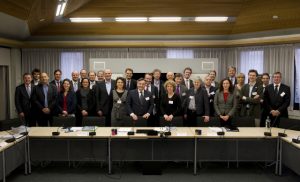 To facilitate national public private cooperation and monitor progress of covenants and other sustainability initiatives, IDH established in 2012 the Strategy Group for Sustainable Production and Trade. An annual meeting of CEOs and directors of relevant companies and CSOs in the Netherlands, hosted by the Ministry of Foreign Affairs.
To facilitate national public private cooperation and monitor progress of covenants and other sustainability initiatives, IDH established in 2012 the Strategy Group for Sustainable Production and Trade. An annual meeting of CEOs and directors of relevant companies and CSOs in the Netherlands, hosted by the Ministry of Foreign Affairs.
In the same year – on request of 4 large coffee roasters, IDH started its Sustainable Coffee Program (SCP) to facilitate precompetitive and public private cooperation in major coffee producing countries. In 2016 the SCP merged into the Global Coffee Platform.
In the cause of 2011 – 2013 the IDH partner network grew from 70 to over 350 public and private partners. The number of programs increased from 6 to 18 and the staff to over 50. Ample international press coverage and impressive results steadily built the image of IDH as a successful convener of partnerships and change agent in service of impact on the Millennium Goals (later Sustainable Development Goals). The attribution report of December 2012 shows the appreciation of both public and private partners of IDH and for the work done. Most of the IDH programs are the largest sustainability initiatives in the sector.
In 2012 and 2013 IDH establishes hubs in both Indonesia and Vietnam to closely align international program efforts with national government strategies and realities on the ground. This ‘local convening’ is over the cause of 2014 and 2015 expanded to countries in Africa (Kenya, Malawi, Tanzania) and Latin America (Brazil).
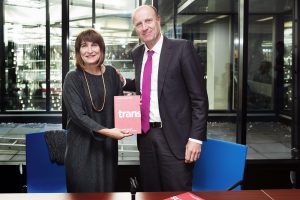 In 2013 the first Impact Studies of the IDH cocoa, cotton and tea programs are released showing positive impact on both livelihoods of farmers and the environment. Although the impact results in especially tea and cotton are impressive, IDH feels its impact can be further improved. The IDH impact studies and the IOB evaluation of 2014 underline our aim to design strategies that help tackle complex issues beyond certification, like the Fertilizer Initiative in cocoa, that IDH already started in 2012.
In 2013 the first Impact Studies of the IDH cocoa, cotton and tea programs are released showing positive impact on both livelihoods of farmers and the environment. Although the impact results in especially tea and cotton are impressive, IDH feels its impact can be further improved. The IDH impact studies and the IOB evaluation of 2014 underline our aim to design strategies that help tackle complex issues beyond certification, like the Fertilizer Initiative in cocoa, that IDH already started in 2012.
On November 14, 2013 at the Value Chain event in Zurich IDH and SECO officially announce their partnership. This partnership involves working closely with the Swiss government, with Swiss companies and CSOs and access to the Swiss embassy network, and an additional 25 M euro co-funding capacity. The partnership follows upon an earlier partnership with Danida. Since 2013 Buza, SECO and Danida are institutional donors of IDH.
In 2014 IDH starts on request of the Dutch Ministry of Foreign Affairs the Initiative for Sustainable Landscapes. In six resource vulnerable landscapes IDH will leverage private interests in sustainable landscape management to convene public private partnerships to jointly design, co-finance and drive plans that halt deforestation, balance land and water use and create alternative livelihoods. Already in 2015 other donors, including NICFI step in. IDH works now in 11 landscapes.
In 2014 Queen Maxima visits IDH to inform herself about another new strategy of IDH: Innovative Finance. On the same day IDH is granted a new period of co-funding capacity by the Dutch government.
In 2015 the Multi-Year Plan 2016-2020 is approved by the Supervisory Board, together with the rigorous Result Measurement Framework. Key innovations are: ISLA, innovative finance, and a stronger emphasize on gender and beyond certification strategies such as Renovation & Rehabilitation, Services Delivery Models and Verified Sourcing Areas. In 2016 a new website was launched.
Please find more information on program developments at the sector pages.
Daan de Wit
Head of Communications
dewit@idhsustainabletrade.com
+31615283774
Available: 9-18.00 hrs CET